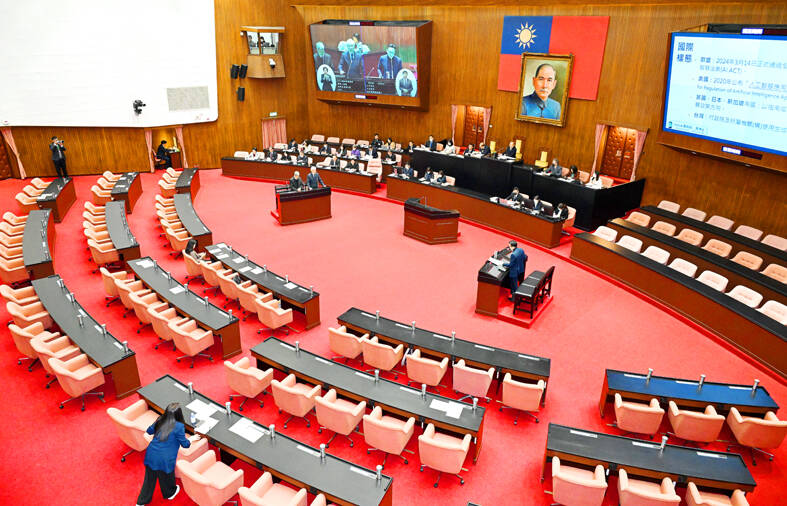The legislature’s Judiciary and Organic Laws and Statutes Committee is slated to review more than a dozen bills proposed by the Chinese Nationalist Party (KMT) today that it says would reform the legislature. However, the Democratic Progressive Party (DPP) said that the proposals are unconstitutional and would push Taiwan back into an authoritarian regime.
Out of the more than 20 bills related to legislative reform, 17 were proposed by the KMT.
KMT legislators Lai Shyh-bao (賴士葆), Wu Tsung-hsien (吳宗憲) and Weng Hsiao-ling (翁曉玲) proposed amendments to the Act Governing the Legislative Yuan’s Power (立法院職權行使法) and the Criminal Code that would make contempt of the legislature a crime.

Photo: Liao Chen-huei, Taipei Times
This would hold government officials accountable for refusing to answer questions, not giving a definite answer and questioning the lawmakers, they said. Officials who are held in contempt of the legislature would be sentenced to up to three years in prison and fined NT$300,000.
Wu, Weng and KMT Legislator Fu Kun-chi (傅?萁) also proposed an amendment that would require the president to submit a “State of the Nation” report by Feb. 1 and give a similar address to legislators before March 1. When lawmakers raise questions, the president should also instantly answer them, the draft states.
Other proposed amendments include giving the legislature the right to conduct investigations, hold hearings and approve appointments of officials. The secret ballot system for the elections of legislative speaker and deputy legislative speaker would be removed as well.
The DPP caucus opposed the proposed amendments, saying that they are unconstitutional and would greatly expand legislative authority.
The proposed amendments would return Taiwan to the era of an authoritarian regime, it said, adding that it would definitely seek interpretations from the Constitutional Court and request an emergency injunction on the bills.
Based on the proposed amendments, legislators would have the right to investigate public legal entities, private legal entities, the military, agencies and groups.
Failure to accept investigation is contempt of the legislature, DPP caucus secretary-general Chuang Jui-hsiung (莊瑞雄) said yesterday.
KMT caucus is asking to hold hearings of the appointments of government officials, which infringes on the president’s and premier’s right to nominate them, said DPP Legislator Chung Chia-pin (鍾佳濱), who is a convener of the committee.
“The KMT and Taiwan People’s Party support that the legislature should have the right to conduct investigations and hold government officials in contempt. This would make legislative authorities transcend those of judicial and control branches,” Chung said.
“Asking the president to deliver a State of the Nation address followed by a question-and-answer session is against the division of authorities stated in the Constitution,” he added.

Japanese footwear brand Onitsuka Tiger today issued a public apology and said it has suspended an employee amid allegations that the staff member discriminated against a Vietnamese customer at its Taipei 101 store. Posting on the social media platform Threads yesterday, a user said that an employee at the store said that “those shoes are very expensive” when her friend, who is a migrant worker from Vietnam, asked for assistance. The employee then ignored her until she asked again, to which she replied: "We don't have a size 37." The post had amassed nearly 26,000 likes and 916 comments as of this

US President Donald Trump said "it’s up to" Chinese President Xi Jinping (習近平) what China does on Taiwan, but that he would be "very unhappy" with a change in the "status quo," the New York Times said in an interview published yesterday. Xi "considers it to be a part of China, and that’s up to him what he’s going to be doing," Trump told the newspaper on Wednesday. "But I’ve expressed to him that I would be very unhappy if he did that, and I don’t think he’ll do that," he added. "I hope he doesn’t do that." Trump made the comments in

Tourism in Kenting fell to a historic low for the second consecutive year last year, impacting hotels and other local businesses that rely on a steady stream of domestic tourists, the latest data showed. A total of 2.139 million tourists visited Kenting last year, down slightly from 2.14 million in 2024, the data showed. The number of tourists who visited the national park on the Hengchun Peninsula peaked in 2015 at 8.37 million people. That number has been below 2.2 million for two years, although there was a spike in October last year due to multiple long weekends. The occupancy rate for hotels

A cold surge advisory was today issued for 18 cities and counties across Taiwan, with temperatures of below 10°C forecast during the day and into tonight, the Central Weather Administration (CWA) said. New Taipei City, Taipei, Taoyuan and Hsinchu, Miaoli and Yilan counties are expected to experience sustained temperatures of 10°C or lower, the CWA said. Temperatures are likely to temporarily drop below 10°C in most other areas, except Taitung, Pingtung, Penghu and Lienchiang (Matsu) counties, CWA data showed. The cold weather is being caused by a strong continental cold air mass, combined with radiative cooling, a process in which heat escapes from